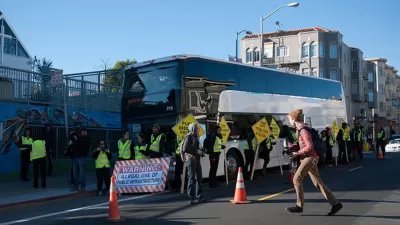They're hated by many, blamed for the city's gentrification, but are an integral part of regional transportation, enabling tech employees to work on the Peninsula and South Bay while living in the city. A city-approved pilot may become permanent.
Last year, San Francisco and the San Francisco Municipal Transportation Agency (SFMTA) approved an 18-month pilot program allowing the so-called Google buses (or employee "tech buses or shuttles," as they are operated by other companies, including Yahoo and Genentech) to pay to use specified stops, including Muni stops.

While the pilot ends on January 31, 2016, Joe Fitzgerald Rodriguez reveals that the city may already be planning on making them permanent, which greatly upsets opponents of the buses as they have California Environmental Quality Act (CEQA) litigation pending.
“Make permanent the 18-month commuter shuttle pilot program,” reads filings at the Planning Commission, which show an air quality study now in planning stages.
The tech bus opponents, or "anti-shuttle advocates," as Rodriguez also calls them, "who sued the SFMTA, The City and tech companies over the program said the development comes as a surprise because the outcome of a lawsuit to compel environmental studies of the program have not been settled," writes Rodriguez.
Opponents of the shuttle program also contend the program will accelerate displacement of area residents, which is a legal environmental concern under the California Environmental Quality Act [CEQA] and may be subject to study.
[For a thorough examination of the displacement issue and tech workers in a regional context, see Kim-Mai Cutler's 2014 piece in TechCrunch posted here.]
Studies by the S.F.-based Anti-Eviction Mapping Project show rents rise considerably in apartments around commuter shuttle stops, which they argue leads to evictions of residents.
Of course, the same argument could be targeted at other forms of transit. As S.F. Planning Commissioner Dennis Richards stated in Rodriguez's article on Tuesday about San Francisco Supervisor Scott Wiener's expansive subway plan:
Wiener’s plan also dovetails with current long term housing planning, Richards said, which may ease housing pressure off The City’s urban core (downtown, South of Market, and The Mission).
“You don’t see (housing) moratoriums in the Sunset, do you?” he said. “Just the Mission, which is right on a BART line.”
While displacement caused by escalating rents is a top issue for San Franciscans, particularly in The Mission, blaming tech workers appears to be on the downswing, as noted by low turnout at some of their recent demonstrations.
Correspondent's note: Rather that call the Peninsula and the South Bay "Silicon Valley," I labeled them geographically because San Francisco is also considered part of Silicon Valley, by some definitions.
FULL STORY: Controversial tech shuttles on road to becoming part of The City’s transit ecosystem

Alabama: Trump Terminates Settlements for Black Communities Harmed By Raw Sewage
Trump deemed the landmark civil rights agreement “illegal DEI and environmental justice policy.”

Study: Maui’s Plan to Convert Vacation Rentals to Long-Term Housing Could Cause Nearly $1 Billion Economic Loss
The plan would reduce visitor accommodation by 25% resulting in 1,900 jobs lost.

Why Should We Subsidize Public Transportation?
Many public transit agencies face financial stress due to rising costs, declining fare revenue, and declining subsidies. Transit advocates must provide a strong business case for increasing public transit funding.

Paris Bike Boom Leads to Steep Drop in Air Pollution
The French city’s air quality has improved dramatically in the past 20 years, coinciding with a growth in cycling.

Why Housing Costs More to Build in California Than in Texas
Hard costs like labor and materials combined with ‘soft’ costs such as permitting make building in the San Francisco Bay Area almost three times as costly as in Texas cities.

San Diego County Sees a Rise in Urban Coyotes
San Diego County experiences a rise in urban coyotes, as sightings become prevalent throughout its urban neighbourhoods and surrounding areas.
Urban Design for Planners 1: Software Tools
This six-course series explores essential urban design concepts using open source software and equips planners with the tools they need to participate fully in the urban design process.
Planning for Universal Design
Learn the tools for implementing Universal Design in planning regulations.
Smith Gee Studio
Alamo Area Metropolitan Planning Organization
City of Santa Clarita
Institute for Housing and Urban Development Studies (IHS)
City of Grandview
Harvard GSD Executive Education
Toledo-Lucas County Plan Commissions
Salt Lake City
NYU Wagner Graduate School of Public Service



























